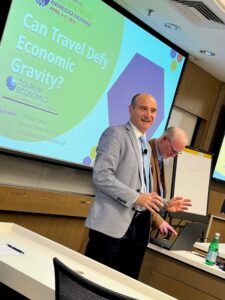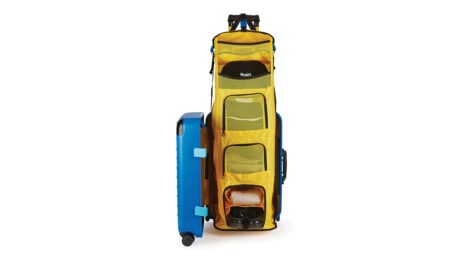Why is hospitality industry sentiment upbeat even as predictions call for economic downturn?
Economists rarely agree on anything, but reports from Moody’s Analytics, Jeffries and The World Bank are in alignment that a recession is coming, probably by the end of 2023. “This is an engineered recession, a recession by design,” said Christian Savelli, director of tourism economics with Oxford Economics, speaking at IACC Americas Knowledge Exchange this week in Durham, North Carolina. He explained that the US Federal Reserve interest rate hikes are purposely depressing the economy in an attempt to reign in inflation. “The good news is that travel is well positioned to withstand any downturn,” he said.

Hospitality industry watcher Chris Meyer, who recently returned from SISO CEO Summit Conference in Las Vegas, agreed that conference organizer executives who attended were largely upbeat even though they are looking at the same recession indicators—an inverted Treasury yield curve, shrinking manufacturing and buying power. “The mood was hugely positive even though everyone agreed about a recession coming,” he reported.
Let’s take a deeper dive into why events and business travel might float above the turbulence.
Travel Priorities
First, some history. Oxford Economics’ Savelli explained that during past recessions, room demand overreacted, with sometimes twice as much of a contraction as the economy overall. But this time, he doesn’t see that pattern because families are in good shape in terms of the amount of debt they are carrying. Many paid off credit cards and even saved during the pandemic.
Additionally, unemployment is at the lowest in 15 years. “If there is a slowdown, we are coming from a good position,” he said.
Read More: Mike Dominguez: Hotel, F&B Prices Aren’t Going Down, and Other Predictions for 2023
Consumer sentiment surveys show that while confidence in the economy is high, people are feeling uneasy because of inflation. “Inflation is easing, but there is still some pain,” Savelli said. “It feels like a treadmill with wages and costs both increasing and reducing expendable income.” Overall, most people are in a good position to weather a short downturn, he concluded.
Savelli also didn’t anticipate the banking liquidity problems that hit Silicon Valley Bank and Credit Suisse will have long-term impacts on consumers. “We expect a recession to be mild because there are no glaring imbalances in the economy. There is resilience,” he said.
United Airlines called the increased desire to travel “a permanent structural change” rather than transitory pent-up demand. Demand is particularly high in hospitality, Savelli said, quoting a February Expedia study that found consumers are prioritizing travel above everything else. “Maybe it’s still the effect of Covid and people realizing there’s more valuable things to do with their lives,” was the comment on an earnings call.
In the fourth quarter of 2022, business travel intentions as measured by the Business Travelers Survey found that levels exceeded 2019 and intention to go to conferences was 10% higher than three years prior. “It should be higher than that after three years, but we are still waiting for international travel to come back fully,” he said.
Executive Exuberance
Hospitality business consultant Chris Meyer, CEO of Chris Meyer Global, put the positive outlook of SISO attendees in context. “Live events already took hits during the pandemic and underperformers were shuttered,” he said. Conferences are enjoying a return to participation even if the mega events are smaller. “The industry has already right-sized,” he said.
If or when a recession hits, he predicted that the first thing to go would be leisure travel, which has been propping up mid-luxury product. Business travel is not all the way back yet, so it still has an upside.
That doesn’t mean it will continue to be business as usual. “A day of reconning may be coming for hotels,” Meyer said. “Everyone is upset about paying the same price or more with new fees and not getting the same level of service.”
On the meetings side, regardless of what happens in the larger economy, conference executives are seeing that they need to change the makeup of events they are producing because the audience that is returning is both younger and screen fatigued. “Virtual participation has fallen off a cliff,” Meyer said. Millennials and Gen Z want a curated journey. “Just don’t call it a trade show,” he advised. They have a bad reputation.
Word at SISO was that attendees want shorter keynotes that directly talk to their needs. They don’t expect to sit in a classroom all day. The networking is the point. The same goes for sponsors and exhibitors. They want their own journey and event organizers need to bring prospects to them. “Don’t expect people to wander the booth floor,” Meyer said.
When it comes to mergers and consolidation, the two big ones that recently closed—Informa’s acquisition of B2B Events company Tarsus in early March for $940 million and Blackstone’s acquisition of Cvent for $6.4 billion—may not be the beginning of an avalanche of deals. Those were special circumstances, he said. “I don’t foresee association consolidations happening before 2025. Even if a deal can be put together, the volunteer board are not motivated,” he said.
When deals do get done for multi-media companies, “events are the value area,” he observed.




